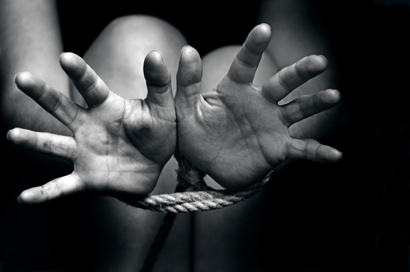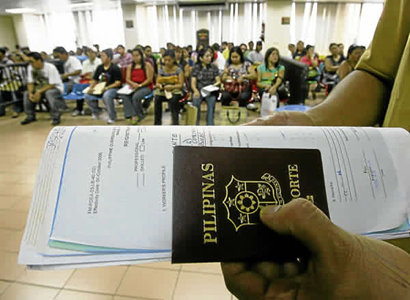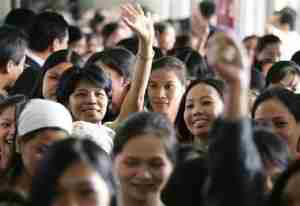Violence and Violations: OFWs and human rights
It all began, unexpectedly enough, over Facebook. Late one evening, a Facebook “friend” I had never met suddenly SOS’d me, saying she desperately needed my help. She had a friend, it seemed, who was a victim of human trafficking in the Middle East. Would I consider “friending” her friend and hearing her story?
So I friended the woman we shall now call “K,” and thus began one of the longest epistolary exchanges I have ever had. Over a period of about six months and hundreds of Facebook messages later, K recounted to me how she had been abused as a child, illegally recruited, “trafficked” from one employer to another, and subjected to all manner of physical and sexual abuse.
Five months later, after a great deal of effort on my part, she was finally back on Philippine soil. By the time I had convinced her to report her story to the National Bureau of Investigation (NBI), she began to name names. Names of other victims who had allegedly been mistreated by recruiters, employers and…. by the Philippine Embassy and its Labor Office in Kuwait. And a Pandora’s Box slowly began — all-too-painfully — to open. In time, almost 50 victims of abuse, torture and trafficking eventually emerged. As of this writing, many of their cases are still pending investigation.

This month, the story of K and many like her is particularly relevant as we mark International Human Rights Consciousness Week, International Day for the Abolition of Slavery, and the Campaign to End Violence Against Women. As economic exiles, our overseas workers are particularly vulnerable to violations of human rights. How do we reckon with, and respond to, the abuses committed against them within, as well as outside, our national borders?
If we listen to some of the victims, we become outraged not only at the sordid details of their lives but at their tragic outcomes. Take the story of “M.” Employed as a domestic helper in Kuwait, she fled her abusive employers to seek shelter at the Philippine Overseas Labor Office/Overseas Workers Welfare Association (POLO/OWWA) shelter in June 2011. M spoke of being forced to work with bare hands using chemicals that burned her skin. In a fit of rage over some minor mistake, her employers forcibly inserted a knife into her vagina, pouring Clorox into her, then finishing things off by inserting crushed chili peppers into her wound. At the hospital, it was discovered that M had suffered severe contusions all over her body and lacerations in her vagina and uterus.
Physical and sexual abuses are among the most prevalent crimes committed against female laborers abroad, usually by their employers. “S” from Saudi Arabia tells the following story. Raped several times by her boss, she was threatened with physical force into performing all kinds of sexual acts. Not surprisingly, she often thought of committing suicide while trapped inside her employer’s home. When she finally escaped and got repatriated, she sought justice against her recruitment agency. But she finally gave up on pursuing the rape case against her employer after learning that he came from a powerful and influential family in Saudi Arabia, one with extensive and important diplomatic ties in the Philippines.
An even more common story is the one told by “B.” Hired as a domestic, her 2-year contract in Kuwait stipulated a salary of US $400 a month, an 8-hour working day, with one day off a week. Much to her dismay, B was paid only US$200 and forced to work from 5:30 am–11:30 pm with no day off and with very little food. The first chance she got, she ran away, seeking shelter at the POLO/OWWA shelter in Kuwait. Reluctant to return home, she found work elsewhere. Once again, she found herself with an abusive employer. When the beatings became unbearable, she fled and was taken in by a Philippine official at the Philippine Embassy in Kuwait. He employed her as his own kasambahay, but only paid her $170 a month, allegedly keeping from her the back wages that her employer had paid. B, it seems, was thus triply abused: first by two employers and then by the very Philippine official assigned to assist distressed OFWs like her.

Indeed, one of the most egregious violations of human rights that OFWs are subjected to is human trafficking. The International Labor Organization estimates are sobering: there are 60,000 to 100,000 Filipino children, and as many as 400,000 women, trafficked each year. From 2005 to 2012, however, there were only 1,693 cases officially recorded in the country. Today, countless cases remain unreported and undocumented.
For the victims, the pursuit of justice is an arduous journey. Civil society groups like the Ople Institute and Visayan Forum have been invaluable in helping them navigate the impersonal workings of state agencies. Often, official delays and obfuscations make it seem to the victims that some officials are tolerant of, if not indifferent to, the abuses they have suffered.
The government, for its part, has sought to respond to the victims’ sufferings. The Aquino administration has increased efforts to prosecute human traffickers, and its efforts have yielded significant results. In 2014, the Philippines was ranked in the Global Slavery Index as a country “making comparatively strong efforts with limited resources” in the campaign against human trafficking.
Many of these cases have been covered by the media but, as with many other things in the news, they have garnered only momentary interest from the public. Several Congressional hearings have been held, chaired by the indefatigable Walden Bello (Akbayan), calling to task the recruitment agencies that have participated in trafficking and other abuses of workers. The Department of Justice and the NBI have also launched a number of investigations, looking into the culpability of a number of government officials and personnel at the POLO/OWWA offices and those employed by the Department of Foreign Affairs.

These investigations are still on-going but, for a wide range of reasons, the path to justice remains slow. Given their dire economic situation, most survivors often opt for cash settlements rather than pursue lengthy criminal, civil and administrative cases against their perpetrators. Demoralized, many victims at times feel that the law and justice are beyond their reach. At times, the entire legal process can feel complex and mystifying. Victims of illegal recruitment, trafficking and especially rape are understandably wary of telling the world about their harrowing experiences. Some think that because they are poor, abuse is a fate they cannot avoid. To make matters worse, there are few avenues they can turn to for meaningful and purposive aid – moral or otherwise — especially from the private sector. Finally, given the complicated workings of government bureaucracies, and the zealous manner with which some protect their own, cases languish, and all-too-often remain unresolved.
Clearly, many challenges remain, and the government, working with civil society, has its work cut out for itself. Still, this year alone, the Inter-Agency Council Against Trafficking reported the prosecution of 159 trafficking-related cases. But by far the most encouraging thing I’ve discovered since I began working on these cases has been the remarkable tenacity of the survivors themselves. Despite their despondency, they consistently refuse abusive treatment and never fail, in their own different ways, to fight back. Their determination is the reason why many of us need to continue to help them in whatever ways we can. The wheels of justice are slowly, if haltingly, beginning to move.
---
Photos from:
http://one-europe.info/user/files/Andreea%20Anastasiu/dreamstime_m_32349546.jpg
http://4.bp.blogspot.com/_GZpSgddg7vQ/R_JUM3z4Y0I/AAAAAAAAA8U/UNWnv13Xm4I/s400/OFW.jpe
- Latest
- Trending




























